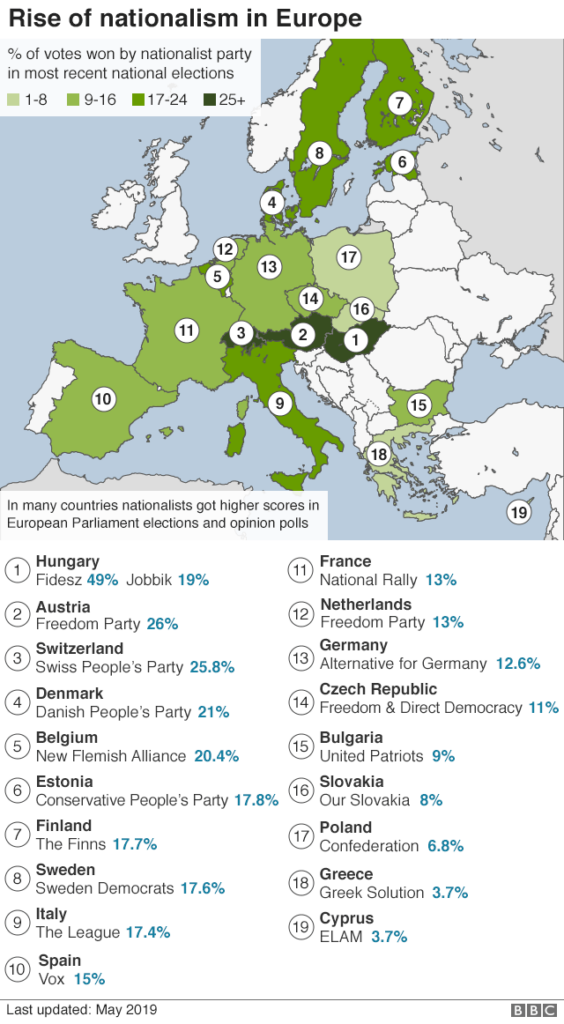
France’s presidential election ended on 24 April with Macron (58% of the vote), the candidate of the Republic Forward party, defeating Le Pen (42% of the vote), the candidate of the far-right National Front (RN).
Le Pen spoke after her defeat. She said, “The result of the second round of voting is already a brilliant success in itself.” Le Pen received only 33.9% of the vote in the second round of the 2017 French election.

The far-right has not only emerged strongly in France but also grown the sphere of influence of this political faction in other European countries. In recent years, the far-right has been moving aggressively on the European continent. The rise of the far-right in France and Europe will have an important impact on the European Union, the transatlantic alliance between Europe and the United States, and world politics.
Traditional politicians are getting unfavoured
The merging of the right into the far-right is one of the biggest changes in the French election. The French far-right has continued to bring far-left forces together around itself. The US Institute for Policy Studies has posted data showing that a growing number of voters who support left-wing parties will support Le Pen in the second round of the French election, confirmed in the final round. Although Melenchon called on voters not to cast a single vote for Le Pen, a survey showed that only 36% of voters who backed Melenchon pledged to support Macron, while 27% said they supported Le Pen in this election. Only 7% of Melenchon’s supporters said they were willing to support Le Pen in the second round of voting in the 2017 election.
In addition, young and middle-aged users of social media favored extremist parties more in this French election. This phenomenon is seen not only in France, but also in other European countries. Many young Europeans find extremist party figures “refreshing” in some ways, whereas traditional politicians like to talk about things without addressing real problems. Some European leaders may be recognising the seriousness of the problem and are beginning to embrace social media. The Spanish Prime Minister’s Office recently prepared a TikTok account for the Prime Minister to attract young voters.
Elections make the far right more popular
Some presses believe that the far-right will be the winner in the European election year 2022. Not only in France, but also in many European countries, where traditional parties are in decline and the far-right is on the rise in European politics.
Since the refugee crisis in 2015, far-right parties in many European countries have achieved greater success than before. The gradual acceptance of far-right parties in various countries is evidenced by the fact that their members continue to enter government at all levels.
Spain’s far-right party, Vox, has also recently been elected to the government of Spain’s autonomous region of Castilla y León. Founded in 2013, in December 2018, Vox became the first far-right party to enter the autonomous region’s parliament since the 1975 democratic reforms, when it took 12 seats in the Andalusian parliamentary elections. In 2019, Spain had two parliamentary elections in April and in November. In the first election,Vox won 24 seats. In the second parliamentary elections, Vox gained 52 seats and became the third-largest party.

In Austria’s 2017 general election, the far-right Freedom Party received 26% of the vote, the party’s strongest performance in a general election in almost 20 years. The Freedom Party and the People’s Party have since formed a coalition government.
In Germany, the strength of far-right parties is also growing. In the 2017 general election, the far-right Alternative for Germany, which was founded just four years ago, won 12.6% of the vote and became the third-largest party in the Bundestag for the first time.

Far-right parties across Europe are also actively forming transnational alliances. According to French media, in July 2021, far-right, conservative, and independent parties from several EU countries signed a joint declaration aimed at building an alliance, including the French National Alliance, the Polish Law and Justice Party, and the Italian Unionist Movement Party. The meeting was held in Warsaw on 4 December 2021. Le Pen told the public that the conference aimed to create a large grouping in the European Parliament, which would together form the second-largest force in the European Parliament.
Europeans accept more thoughts from the right
The rapid rise of the far-right in Europe has led to discussions about how to reverse public support for the far-right. According to the Guardian, some European party strategists believe that mainstream parties should adopt tougher policies in areas such as immigration and integration so that far-right parties will not have a “foothold”.
However, it turns out that simply adopting tougher policies will not bring voters back into the fold of mainstream parties, but rather legitimize the ideas and political agendas of far-right parties. For example, in the run-up to the 2018 elections in Bavaria, Germany, the CSU endorsed many of the hardline immigration policies proposed by the Alternative for Germany party, yet in the elections, the CSU lost a large number of votes while the Alternative for Germany gained 10.2% of the vote. This phenomenon was also seen in other European countries. Le Pen’s statement may explain this phenomenon, “Why should voters choose a copy when they have the original?”
Some analysts believe that the rise of the far-right is closely related to the “pessimistic” and “declinist” atmosphere in Europe. The Europeans feel that Europe has lost its strength, and the attacks by the extremist group Islamic State in several countries have largely contributed to this mood and atmosphere. Plus, a growing number of voters believe that traditional political parties are unable to solve their problems. When traditional political ideas are disappointing, extremist parties emerge.
Oliver Fuchs, a scholar of European politics in Berlin, Germany, told the Global Times that the history of far-right parties in Europe dates back to WWII, and after decades, they were revitalized in the 1980s and 1990s. In the 21st century, terrorist attacks such as the 911 have provided “sustenance” for far-right parties. However, it was the refugee crisis of 2015 that brought about the rise of far-right parties. This crisis became a “melting pot of European problems” and many people wanted to change the status quo by supporting far-right parties.
At the economic level, the abhorrence of economic globalization by some people in Europe and the US has also been the ground for the growth of far-right parties. Studies have shown that over the past half-century, centrist politicians on both the left and the right in Europe have embraced economic globalization, but this phenomenon has not brought many benefit to a significant proportion of workers and fixed income earners in Europe and the US, who feel left behind and have come to despise the political elite as a whole, and the far-right has seized this opportunity to rally around these people who have been left behind by the times.
In addition, the economic crisis of 2008, the COVID-19 epidemic, and the Russian-Ukrainian crisis have further deepened the dissatisfaction of the European public with the social status quo, which in turn has manifested itself in antipathy towards traditional political parties. At the same time, the rise of nationalism in the United States and Brexit have also contributed to the development of the far-right in Europe.
A major characteristic of the European far-right in dealing with international relations is that it emphasizes the priority of national interests and is relatively conservative. It is conceivable that when dealing with foreign relations, these parties will still, to a large extent, emphasize the priority of real interests and may pay less attention to ideological issues.
(Source: Global Times, BFM, CNN International, BBC)



